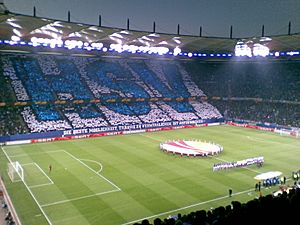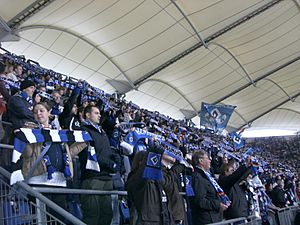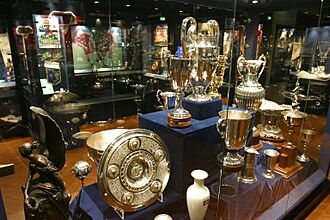Hamburger SV facts for kids
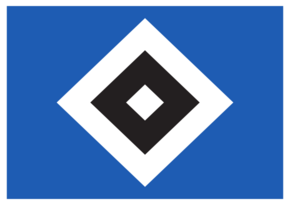 |
|||
| Full name | Hamburger Sport-Verein e.V. | ||
|---|---|---|---|
| Nickname(s) | Die Rothosen (The Red Shorts) | ||
| Short name | HSV | ||
| Founded | 29 September 1887 (as SC Germania) 2 June 1919 (as Hamburger SV) |
||
| Ground | Volksparkstadion, Hamburg |
||
| Capacity | 57,000 | ||
| President | Marcell Jansen | ||
| Sporting director | Stefan Kuntz | ||
| Head coach | Merlin Polzin | ||
| League | 2. Bundesliga | ||
| 2020–21 | 2. Bundesliga, 4th of 18 | ||
|
|
|||
Hamburger Sport-Verein e.V. (often called Hamburger SV or HSV) is a German sports club from Hamburg. Its biggest part is the football team. HSV was officially formed in June 1919. It was created by combining three older clubs. The oldest of these, SC Germania, started on 29 September 1887. HSV considers this its founding date.
HSV has won the German national championship six times. They also won the DFB-Pokal three times and the League Cup twice. Their best time was from the mid-1970s to the mid-1980s. During this period, they won the 1976–77 European Cup Winners' Cup and the 1982–83 European Cup. Famous players from this era included Horst Hrubesch, Manfred Kaltz, and Felix Magath. HSV's last major trophy was the 1986–87 DFB-Pokal.
Until the 2017–18 season, HSV was the only team that had always played in Germany's top football league. They had been in every season of the Bundesliga since it began in 1963. However, they were moved down to a lower league for the first time in 2018. But good news! After a seven-year wait, HSV was promoted back to the Bundesliga in the 2024–25 season.
HSV plays its home games at the Volksparkstadion in Hamburg. The club's official colors are blue, white, and black. However, their home uniform is white jerseys and red shorts. This is why their most common nickname is "die Rothosen" (The Red Shorts). Because it is one of Germany's oldest clubs, it is also called der Dinosaurier (the Dinosaur). HSV has big rivalries with Werder Bremen (the Nordderby) and FC St. Pauli (the Hamburg derby).
HSV is known for focusing on developing young players. The club also has other sports sections. These include badminton, baseball, basketball, bowling, boxing, cricket, darts, ice hockey, field hockey, golf, gymnastics, and handball. HSV is one of the largest sports clubs in Germany. It has over 84,000 members across all its different sports.
Contents
Club History
How HSV Started
Hamburger Sport-Verein (HSV) began when three clubs joined together. The first club was Sport-Club Germania Hamburg, started on 29 September 1887. This club was originally for athletics, not football. They started playing football in 1891 when some English players joined. SC Germania won the Hamburg-Altona championship five times, starting in 1896.
The other two clubs that merged were Hamburger FC (founded in 1888) and FC Falke Eppendorf (from 1906). These three clubs merged on 2 June 1919 to form HSV. They merged because World War I had made them too weak to continue alone.
SC Germania and Hamburger SC 1888 were among the 86 clubs that started the German Football Association (DFB) in 1900. FC Falke was not a very successful team and played in lower leagues.
Early Football Success
In 1922, the new Hamburger SV played in the national final against 1. FC Nürnberg. The game was very long and ended in a draw. The replay also ended in a draw when Nuremberg had too few players to continue. The DFB first gave the win to HSV, but then asked them to refuse the title. HSV agreed, and no champion was officially named that year.
HSV won its first official national title in 1923. They beat Union Oberschöneweide in the final. They won the title again in 1928, defeating Hertha BSC 5–2.
During the 1930s and 1940s, HSV had local success in the Gauliga Nordmark. They won the league championship in 1937, 1938, 1939, 1941, and 1945.
After the War
After World War II, HSV won the championship of the newly formed Stadtliga Hamburg in 1946. They also won the championship of the British occupation zone in 1947 and 1948.
From 1947 to 1963, HSV was a very strong team in the Oberliga Nord. They won the Oberliga title 15 times in 16 seasons. In 1953, Uwe Seeler, who would become the club's all-time top scorer, joined the team. He scored 267 goals in 237 Oberliga matches.
HSV reached the DFB-Pokal final in 1956 but lost. They also lost in the national championship finals in 1957 and 1958.
In 1960, HSV became German champions again, beating 1. FC Köln 3–2. Uwe Seeler scored twice and was named West German Footballer of the Year.
As national champions, HSV played in the 1960–61 European Cup. This was their first time in a European competition. They reached the semi-finals, where they were defeated by Barcelona. A record crowd of 77,600 fans watched the first leg against Barcelona at the Volksparkstadion.
Joining the Bundesliga
The Bundesliga, Germany's first professional football league, started in 1963. HSV was one of the 16 clubs invited to join. HSV was the only original Bundesliga team that had never been moved down to a lower league until 2018.
In August 1963, HSV won its first DFB-Pokal by beating Borussia Dortmund 3–0. In the first Bundesliga season, HSV finished sixth. Uwe Seeler was the top scorer with 30 goals.
In 1967, HSV lost the DFB-Pokal final to Bayern Munich. However, they played in the European Cup Winners' Cup the next season and reached the final, losing to Milan.
Uwe Seeler retired in 1972. He scored 137 goals in 239 Bundesliga matches and 507 goals in 587 games overall.
The Golden Era
In 1973, HSV won the first DFB-Ligapokal, beating Borussia Mönchengladbach 4–0. In 1976, they won the DFB-Pokal for the second time. The next year, HSV won its first international trophy, the 1976–77 European Cup Winners' Cup, by beating Anderlecht 2–0. After this, English star player Kevin Keegan joined the club from Liverpool.
In 1978, Branko Zebec became HSV's coach. He led the club to its first Bundesliga title in his first season. Kevin Keegan was the top scorer and was named European Footballer of the Year for the second time.
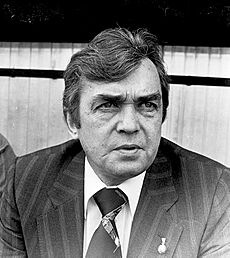
In the 1979–80 season, HSV returned to the European Cup. They beat Real Madrid in the semi-finals but lost 1–0 to Nottingham Forest in the final.
In 1981, Austrian coach Ernst Happel took over. In his first season, HSV won the Bundesliga title again. They also reached the UEFA Cup final but lost to IFK Göteborg.
Between January 1982 and January 1983, HSV went 36 games undefeated in the Bundesliga. This was a league record for many years.
HSV won their third Bundesliga title in 1982–83. In the same year, they defeated Juventus 1–0 in Athens to win their first European Cup.
In December 1983, HSV played against Grêmio from Brazil in the Intercontinental Cup in Tokyo. Grêmio won the trophy.
In 1986–87, HSV finished second in the Bundesliga. They also won their fourth DFB-Pokal, beating Stuttgarter Kickers 3–1 in the final. After this success, Ernst Happel left the club. He is HSV's most successful coach.
Recent Years
In the early 1990s, HSV faced financial difficulties. The team's performance also declined. In October 1995, Felix Magath returned as coach, and Uwe Seeler became club president. Under them, HSV finished fifth in the Bundesliga.
In 1997, Frank Pagelsdorf became coach and stayed for over four years. HSV finished third in 1999–2000, their best result since 1987.
On 2 September 2000, the new Volksparkstadion officially opened. In 2000–01, HSV played in the UEFA Champions League for the first time. They drew 4–4 with Juventus in their first match and later beat them 3–1.
In July 2003, HSV won the DFB-Ligapokal, their first trophy in 16 years.
In August 2004, HSV lost a DFB-Pokal match against SC Paderborn. The referee, Robert Hoyzer, was later found to have taken money to unfairly influence the game.
HSV qualified for the Champions League again in 2006. They finished last in their group. In the league, they struggled but avoided being moved down. They also won the Intertoto Cup.
In the 2008–09 season, under coach Martin Jol, HSV reached the semi-finals of both the UEFA Cup and the DFB-Pokal. They lost both to their rivals, Werder Bremen.
On 13 October 2011, Thorsten Fink became coach. He helped the team avoid being moved down to a lower league. In 2012–13, HSV finished seventh. However, they also had a big 9–2 loss to Bayern Munich.
HSV narrowly avoided being moved down in 2014 and 2015 by winning special play-off games.
Relegation and Return to Bundesliga
In the 2017–18 Bundesliga season, HSV struggled a lot. They had three different coaches during the season. Despite a win on the final day, they were moved down to the 2. Bundesliga for the first time in the Bundesliga's 55-year history. This caused much disappointment among fans.
For the next few seasons, HSV tried hard to get back to the Bundesliga. They finished third or fourth several times, just missing out on promotion. In the 2021–22 season, they reached the promotion play-off but lost to Hertha Berlin. In the 2022–23 season, they were very close to direct promotion on the last day but missed it by just a few minutes. They then lost the play-off again.
Finally, in the 2024–25 season, HSV achieved their goal! They were promoted back to the Bundesliga after a seven-year wait. A 6–1 win over Ulm secured their promotion with one game left. There was huge excitement at the stadium, and many fans celebrated on the pitch. Some fans needed medical attention due to the excitement. Even though they were promoted, they finished as runners-up in the league.
Home Stadium
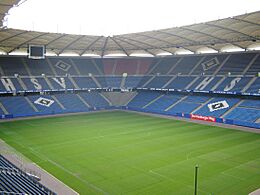
Hamburger SV plays its home games at the Volksparkstadion. This stadium was rebuilt and opened in 2000. It can hold 57,000 fans, with about 47,000 seats and 10,000 standing places. The original Volksparkstadion hosted games for the 1974 World Cup and UEFA Euro 1988.
The current Volksparkstadion is a top-rated stadium by UEFA. This means it can host major European finals. It was also one of the stadiums for the 2006 World Cup in Germany. In 2010, it hosted the 2010 UEFA Europa League Final.
HSV fans can even be buried in a special graveyard near the stadium. It is covered in grass from the original Hamburg pitch.
Club Rivals and Friends
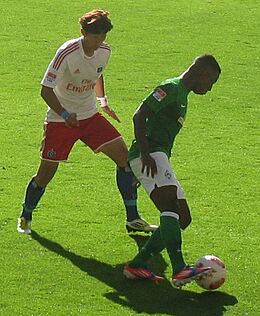
HSV has a big rivalry with Werder Bremen, another team from Northern Germany. Their matches are called the Nordderby. In 2009, they played each other four times in just three weeks in different competitions.
HSV also has a local rivalry with FC St. Pauli. This is known as the Hamburg derby. When they played each other in the 2. Bundesliga after seven years in different leagues, there was a lot of excitement and tension between fan groups. In March 2019, HSV won 4–0 at St. Pauli's stadium, their first win there since 1962.
HSV has a friendly connection with the Scottish club Rangers. This link started in 1977 when HSV fans visited Rangers matches and loved the atmosphere. The connection grew stronger when player Jörg Albertz moved from Hamburg to Rangers. In February 2021, the two clubs made their friendship official.
On the other hand, St. Pauli has a long-standing friendship with Rangers' city rivals, Celtic. This is partly because of the HSV-Rangers link and because Celtic and St. Pauli fans share similar social views.
HSV also has a friendly bond with Hannover 96. Both clubs are known by the abbreviation "HSV". When they play, the visiting team's song is played, and fans from both sides chant "HSV".
Additionally, Hamburger SV has a friendship with Arminia Bielefeld. Both teams share the colors black, white, and blue. Fans often chant, "Schwarz, weiß, blau – Arminia und der HSV" (Black, white, blue – Arminia and the HSV).
Some HSV fan groups also have good connections with the fourth-division team VfB Lübeck. In 2013, HSV helped VfB Lübeck, who were facing financial problems, by playing a friendly match and giving them all the money earned from ticket sales.
Fans and Culture
The band Abschlach! wrote the HSV anthem "Mein Hamburg lieb ich sehr". This song is played before every HSV game.
HSV has over 700 official fan clubs in Germany and other countries. These include groups like "Rautengeil Fallingbostel" and "Totale Offensive e. V.". The "Rothosen" supporters' association, started in 1972, is the oldest HSV fan club.
In 2006, HSV started an official fan club for gay and bisexual fans called "BLUE PRIDE", which later joined with "Volksparkjunxx".
The Supporters Club, founded in 1993, has over 66,000 members. These fans are also members of HSV.
Club Kit and Colors
The club's official colors are blue, white, and black. Fans often use the combination "schwarz-weiss-blau" (black-white-blue) in their songs. The club crest is a black and white diamond on a blue background. These colors came from SC Germania, one of the original clubs. The blue background is a nod to Hamburg's history as a port city.
However, the team's home uniform is white jerseys and red shorts. These are the colors of the city of Hamburg. This is why the team's most common nickname is die Rothosen ("the Red Shorts"). HSV was also known as der Dinosaurier ("the Dinosaur") because of its age. They even had a dinosaur mascot named "Hermann".
HSV's kit has been made by Adidas for many years, including from 1978 to 1995, and again since 2007. The first shirt sponsorship began in 1974.
- Sponsor
| Season | Sponsor |
|---|---|
| 1974–1976 | Campari |
| 1976–1979 | Hitachi |
| 1979–1987 | BP |
| 1987–1994 | Sharp |
| 1994–1999 | Hyundai |
| 1999–2003 | TV Spielfilm |
| 2003–2006 | ADIG |
| 2006–2020 | Emirates |
| 2020–2022 | Orthomol |
| 2022– | HanseMerkur |
- Kit sponsor
| Season | Kit Sponsor |
|---|---|
| 1887–1965 | In–House |
| 1965–1966 | Umbro |
|
1966–1969 |
In–House |
|
1969–1970 |
Erima |
|
1970–1974 |
In–House |
| 1974–1976 | Adidas |
| 1976–1978 | Umbro |
| 1978–1979 | Adidas |
| 1979–1980 | Erima |
| 1979–1995 | Adidas |
| 1995–1998 | Uhlsport |
| 1998–2001 | Fila |
| 2001–2005 | Nike |
| 2005–2007 | Puma |
| 2007–Present | Adidas |
International Competitions
HSV first played in European competitions in 1960. They reached the semi-finals of the European Cup in 1961. Later, they played in the final twice. They lost 1–0 to Nottingham Forest in 1980. But they won 1–0 against Juventus in 1983. HSV is one of only three German teams to have won the European Cup.
HSV won the UEFA Cup Winners' Cup in 1976–77. They have also been runners-up in that competition and the UEFA Cup. Their most recent European journey was in the 2009–10 UEFA Europa League, where they reached the semi-finals.
In 1982, Hamburg became the first club in Europe to have been runners-up in all three major UEFA club competitions. They lost the finals of the 1967–68 European Cup Winners' Cup, the 1979–80 European Cup, and the 1981–82 UEFA Cup. They also became the first and only club to have been runners-up in all six major international club competitions, including the European Super Cup and the Intercontinental Cup.
HSV's biggest win in a European match was 8–0 against Romanian team Brașov in 1974. Their biggest defeat was 6–0 to Liverpool in the 1977 Super Cup. Manfred Kaltz has played the most European games for HSV (81). Horst Hrubesch is their top European goalscorer with 20 goals.
Club Achievements
HSV holds the record in German football for winning the most regional titles, with 31. These regional titles helped them qualify for the German Championship.
Hamburg's three Bundesliga championships allow the club to display one gold star on their badge. This star shows they are a "Deserving Champion Club."
Until the 2017–18 season, HSV was proud to be the only club that had played in every Bundesliga season since it started. A large clock at the Volksparkstadion used to count the time since the league was founded on 24 August 1963.
National Titles
- German Champions:
- Winners: 1923, 1928, 1960, 1978–79, 1981–82, 1982–83
- Runners-up: 1923–24, 1956–57, 1957–58, 1975–76, 1979–80, 1980–81, 1983–84, 1986–87
- DFB-Pokal:
- Winners: 1962–63, 1975–76, 1986–87
-
- Runners-up: 1955–56, 1966–67, 1973–74
- DFB-Ligapokal:
- Winners: 1972–73, 2003
- DFB-Supercup:
- Runners-up: 1977, 1983, 1987
European Titles
- European Cup/UEFA Champions League:
- Winners: 1982–83
- Runners-up: 1979–80
- European Cup Winners' Cup:
- Winners: 1976–77
- Runners-up: 1967–68
- UEFA Cup/UEFA Europa League:
- Runners-up: 1981–82
- UEFA Super Cup:
- Runners-up: 1977, 1983
- UEFA Intertoto Cup:
- Winners: 2005, 2007 (Outright Winners)
- Runners-up: 1999
- Intertoto Cup:
- Group Winners: 1970, 1994
Worldwide Titles
- Intercontinental Cup
- Runners-up: 1983
Double Wins
- 1982–83: Won both the League and European Cup
Regional Titles (Unrecognized)
- Northern German football championship
- Winners (10): 1921, 1922, 1923, 1924, 1925, 1928, 1929, 1931, 1932, 1933 (record)
- Oberliga Nord
- Winners (15): 1948, 1949, 1950, 1951, 1952, 1953, 1955, 1956, 1957, 1958, 1959, 1960, 1961, 1962, 1963 (record)
- Gauliga Nordmark
- Winners: 1937, 1938, 1939, 1941
- Gauliga Hamburg
- Winners: 1945
- Stadtliga Hamburg
- Winners: 1946
- British occupation zone championship
- Winners: 1947, 1948 (record)
Players
Current Squad
|
|
Other Players Under Contract
|
Out on Loan
|
Club Personnel
| Position | Staff |
|---|---|
| Head coach | |
| Assistant coach | |
| Assistant coach | |
| Goalkeeping coach | |
| Director of Professional Football | |
| Director of Youth Development | |
| Strength and conditioning coach | |
| Strength and conditioning coach | |
| Rehab coach | |
| Team doctor | |
| Team doctor | |
| Physiotherapist | |
| Physiotherapist | |
| Game analyst | |
| Game analyst | |
| Team Manager | |
| Team Manager | |
| Kit man | |
| Kit man |
Last updated: 24 November 2024
Source: Hamburger SV official website: https://www.hsv.de/en/season/medical-advisory-staff
Head Coaches Since 1963
| Name | From | To | Days | Played | Win | Drawn | Lost | Win % | Honours |
|---|---|---|---|---|---|---|---|---|---|
| 1 July 1963 | 7 May 1964 | 311 | 29 | 11 | 9 | 9 | 37.93 | 1962–63 DFB-Pokal – winner | |
| 8 May 1964 | 17 April 1966 | 709 | 59 | 22 | 12 | 25 | 37.29 | ||
| 18 April 1966 | 30 June 1967 | 438 | 39 | 12 | 11 | 16 | 30.77 | 1966–67 DFB-Pokal – runners-up | |
| 1 July 1967 | 30 June 1968 | 365 | 34 | 11 | 11 | 12 | 32.35 | 1967–68 European Cup Winners' Cup – runners-up | |
| 1 July 1968 | 30 June 1970 | 729 | 68 | 25 | 21 | 22 | 36.76 | ||
| 1 July 1970 | 30 June 1973 | 1095 | 102 | 36 | 26 | 40 | 35.29 | 1972–73 DFB-Ligapokal – winner | |
| 1 July 1973 | 30 June 1977 | 1460 | 136 | 62 | 29 | 45 | 45.59 | 1973–74 DFB-Pokal – runners-up 1975–76 Bundesliga – runners-up 1975–76 DFB-Pokal – winner 1976–77 European Cup Winners' Cup – winner |
|
| 1 July 1977 | 27 October 1977 | 118 | 12 | 6 | 1 | 5 | 50.00 | 1977 DFB-Supercup – runners-up | |
| 28 October 1977 | 30 June 1978 | 245 | 22 | 8 | 5 | 9 | 36.36 | 1977 European Super Cup – runners-up | |
| 1 July 1978 | 18 December 1980 | 901 | 85 | 54 | 17 | 14 | 63.53 | 1978–79 Bundesliga – winner 1979–80 Bundesliga – runners-up 1979–80 European Cup – runners-up |
|
| 19 December 1980 | 30 June 1981 | 193 | 17 | 8 | 5 | 4 | 47.06 | 1980–81 Bundesliga – runners-up | |
| 1 July 1981 | 30 June 1987 | 2190 | 204 | 109 | 53 | 42 | 53.43 | 1981–82 Bundesliga – winner 1981–82 UEFA Cup – runners-up 1982–83 Bundesliga – winner 1982–83 European Cup – winner 1983 Intercontinental Cup – runners-up 1983 European Super Cup – runners-up 1983 DFB-Supercup – runners-up 1983–84 Bundesliga – runners-up 1986–87 Bundesliga – runners-up 1986–87 DFB-Pokal – winner |
|
| 1 July 1987 | 9 November 1987 | 131 | 15 | 5 | 4 | 6 | 33.33 | 1987 DFB-Supercup – runners-up | |
| 11 November 1987 | 4 January 1990 | 785 | 75 | 32 | 19 | 24 | 42.67 | ||
| 5 January 1990 | 10 March 1992 | 795 | 73 | 28 | 22 | 23 | 38.36 | ||
| 12 March 1992 | 21 September 1992 | 193 | 19 | 3 | 8 | 8 | 15.79 | ||
| 23 September 1992 | 5 October 1995 | 1107 | 105 | 31 | 36 | 38 | 29.52 | ||
| 6 October 1995 | 18 May 1997 | 590 | 58 | 21 | 18 | 19 | 36.21 | ||
| 19 May 1997 | 30 June 1997 | 42 | 2 | 1 | 1 | 0 | 50.00 | ||
| 1 July 1997 | 17 September 2001 | 1593 | 142 | 51 | 46 | 45 | 35.92 | ||
| 18 September 2001 | 3 October 2001 | 15 | 2 | 0 | 1 | 1 | 0.00 | ||
| 4 October 2001 | 22 October 2003 | 748 | 69 | 26 | 20 | 23 | 37.68 | 2003 DFB-Ligapokal – winner | |
| 23 October 2003 | 17 October 2004 | 360 | 33 | 14 | 5 | 14 | 42.42 | ||
| 18 October 2004 | 1 February 2007 | 836 | 79 | 36 | 20 | 23 | 45.57 | 2005 UEFA Intertoto Cup – winner | |
| 2 February 2007 | 30 June 2008 | 514 | 49 | 23 | 15 | 11 | 46.94 | 2007 UEFA Intertoto Cup – winner | |
| 1 July 2008 | 26 May 2009 | 329 | 34 | 19 | 4 | 11 | 55.88 | ||
| 1 July 2009 | 25 April 2010 | 298 | 32 | 12 | 12 | 8 | 37.50 | ||
| 26 April 2010 | 30 June 2010 | 65 | 2 | 1 | 1 | 0 | 50.00 | ||
| 1 July 2010 | 13 March 2011 | 255 | 26 | 11 | 4 | 11 | 42.31 | ||
| 14 March 2011 | 19 September 2011 | 189 | 15 | 2 | 6 | 7 | 13.33 | ||
| 19 September 2011 | 17 October 2011 | 28 | 3 | 2 | 0 | 1 | 66.67 | ||
| 10 October 2011 | 16 October 2011 | 6 | 1 | 1 | 0 | 0 | 100.00 | ||
| 17 October 2011 | 16 September 2013 | 700 | 64 | 21 | 18 | 25 | 32.81 | 2012 Peace Cup – winner | |
| 17 September 2013 | 24 September 2013 | 7 | 1 | 0 | 0 | 1 | 0.00 | ||
| 25 September 2013 | 16 February 2014 | 144 | 15 | 3 | 3 | 9 | 20.00 | ||
| 16 February 2014 | 15 September 2014 | 211 | 16 | 3 | 3 | 10 | 18.75 | ||
| 16 September 2014 | 22 March 2015 | 187 | 23 | 6 | 6 | 11 | 26.09 | ||
| 22 March 2015 | 15 April 2015 | 24 | 2 | 0 | 0 | 2 | 0.00 | ||
| 15 April 2015 | 25 September 2016 | 529 | 50 | 16 | 12 | 22 | 32.00 | ||
| 25 September 2016 | 21 January 2018 | 483 | 52 | 16 | 10 | 26 | 30.77 | ||
| 22 January 2018 | 12 March 2018 | 49 | 7 | 0 | 3 | 4 | 0.00 | ||
| 13 March 2018 | 23 October 2018 | 224 | 18 | 9 | 4 | 5 | 50.00 | ||
| 23 October 2018 | 19 May 2019 | 208 | 28 | 14 | 5 | 9 | 50.00 | ||
| 29 May 2019 | 30 June 2020 | 399 | 36 | 14 | 13 | 9 | 38.89 | ||
| 6 July 2020 | 3 May 2021 | 302 | 32 | 14 | 10 | 8 | 43.75 | ||
| 3 May 2021 | 30 June 2021 | 58 | 3 | 2 | 0 | 1 | 66.67 | ||
| 1 July 2021 | 11 February 2024 | 949 | 102 | 51 | 24 | 27 | 50.00 | ||
| 13 February 2024 | 20 February 2024 | 7 | 1 | 0 | 1 | 0 | 0.00 | ||
| 20 February 2024 | 24 November 2024 | 0 | 0 | 0 | 0 | — | |||
| 24 November 2024 | present | 0 | 0 | 0 | 0 | — |
Last updated: 24 November 2024
Source:
- * Served as caretaker coach.
Other Club Sections
HSV-Panthers (Futsal)
The Futsal team of Hamburger SV is called "HSV Panthers". They play in the top German Futsal league, the Futsal Bundesliga.
The team has won the German Futsal Championship four times. This makes them the German record champions. The HSV Panthers have also played in the UEFA Futsal Champions League four times. In 2015, they were the first German team to reach the elite round. Several players from the HSV Panthers also play for the German national futsal team.
Hamburger SV II
The reserve team, Hamburger SV II, helps young players develop. It prepares them to join the main team.
Women's Football
The women's football section started in 1970. The team played in the top women's league, the Bundesliga, from 2003 to 2012.
Other Sports at HSV
The club also has sections for other sports. The rugby section was re-established in 2006. The men's baseball team, HSV Hamburg (known as the Stealers), started in 1985. They play in the first division of the Baseball Bundesliga. Other sports include volleyball and cricket. HSV Cricket has won several championships in the North German Cricket Federation league.
See also
 In Spanish: Hamburgo S.V. para niños
In Spanish: Hamburgo S.V. para niños
 | Bessie Coleman |
 | Spann Watson |
 | Jill E. Brown |
 | Sherman W. White |



